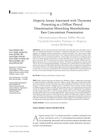40 citations,
June 2021 in “Clinical, cosmetic and investigational dermatology” JAK inhibitors show promise in effectively treating hair loss from alopecia areata.
 40 citations,
May 2010 in “Australasian Journal of Dermatology”
40 citations,
May 2010 in “Australasian Journal of Dermatology” Chronic hair shedding may be caused by less variation in hair growth times and might stop on its own after several years.
29 citations,
February 2011 in “PloS one” Astressin-B can reverse and prevent hair loss in stressed mice.
 24 citations,
February 1987 in “Drugs”
24 citations,
February 1987 in “Drugs” Minoxidil promotes hair regrowth, but more research needed for effectiveness and response factors.
6 citations,
June 2021 in “EClinicalMedicine” ALRV5XR significantly improves hair density in women with hair loss and is well-tolerated.
 1 citations,
July 2023 in “Cureus”
1 citations,
July 2023 in “Cureus” Some treatments for hereditary hair loss are effective but vary in results and side effects; new therapies show promise but need more research.
 1 citations,
July 2023 in “Journal of Clinical Medicine”
1 citations,
July 2023 in “Journal of Clinical Medicine” Different causes of beard hair loss have various treatments, including medications, lifestyle changes, and procedures to stimulate hair growth.
 1 citations,
February 2017 in “MOJ bioequivalence & bioavailability”
1 citations,
February 2017 in “MOJ bioequivalence & bioavailability” Treating hair loss effectively may require a multi-sided approach, using different treatments together, and topical treatments could be more effective and safer than oral ones.
 January 2024 in “Biomedical journal of scientific & technical research”
January 2024 in “Biomedical journal of scientific & technical research” CRISPR/Cas9 gene-editing may effectively treat hair loss but requires more research for safe use.
 September 2023 in “Forum Dermatologicum”
September 2023 in “Forum Dermatologicum” Various treatments for common hair loss in men and women are effective, but should be tailored to individual needs and potential side effects.
5 citations,
May 2015 in “JRSM open” If a child is losing a lot of eyelashes and it keeps happening, doctors should look carefully at their health history because it might be a sign of a different health problem.
 1 citations,
May 2024 in “Türkiye klinikleri tıp bilimleri dergisi”
1 citations,
May 2024 in “Türkiye klinikleri tıp bilimleri dergisi” A rare case showed hair regrowth after chemotherapy for thymoma, suggesting a link between alopecia areata and thymoma.
1 citations,
October 2022 in “Evidence-based Complementary and Alternative Medicine” Traditional Chinese Medicine may help treat hair loss but needs more research.
 August 2024 in “Stem Cell Research & Therapy”
August 2024 in “Stem Cell Research & Therapy” New regenerative therapies show promise for treating hair loss.
 May 2015 in “Hair transplant forum international”
May 2015 in “Hair transplant forum international” The article concludes that PRP might help with hair loss, but more detailed research is necessary.
 34 citations,
October 2018 in “Journal of The American Academy of Dermatology”
34 citations,
October 2018 in “Journal of The American Academy of Dermatology” Hormone treatments can help with women's skin and hair disorders, but they need careful monitoring and more research.
 10 citations,
September 2021 in “JAMA Dermatology”
10 citations,
September 2021 in “JAMA Dermatology” Different types of persistent hair loss after chemotherapy respond differently to treatments.
 6 citations,
September 2012 in “Our Dermatology Online”
6 citations,
September 2012 in “Our Dermatology Online” Retinoids are effective for various skin conditions and hair loss but have serious side effects, so low doses are recommended.
 6 citations,
October 2005 in “Indian Journal of Dermatology”
6 citations,
October 2005 in “Indian Journal of Dermatology” The document discusses male and female pattern hair loss, its diagnosis methods, FDA-approved treatments like finasteride and minoxidil, their side effects, and the role of lifestyle changes.
4 citations,
March 2022 in “Pharmaceutics” Regenerative cellular therapies show promise for treating non-scarring hair loss but need more research.
 2 citations,
January 2023 in “Journal of Education, Health and Sport”
2 citations,
January 2023 in “Journal of Education, Health and Sport” Cognitive-behavioral therapy with habit reversal training is the most effective treatment for trichotillomania.
 June 2024 in “Stem cell research & therapy”
June 2024 in “Stem cell research & therapy” Regenerative medicine shows promise for treating skin disorders like hair loss and vitiligo.
 January 2024 in “Journal of Natural Remedies”
January 2024 in “Journal of Natural Remedies” Solanum nigrum extract may help regrow hair.
April 2019 in “The journal of investigative dermatology/Journal of investigative dermatology” Blocking JAK1 or JAK3 helps reverse hair loss in a mouse model of alopecia areata.
 September 2023 in “Cureus”
September 2023 in “Cureus” Topical finasteride might be a good alternative for hair loss treatment with fewer side effects, but more research is needed.

Male androgenetic alopecia (MAA) is a common, hereditary hair loss condition in men, linked to heart disease, and can be treated with minoxidil, finasteride, or hair transplantation.
 7 citations,
November 1987 in “Pharmacotherapy: The Journal of Human Pharmacology and Drug Therapy”
7 citations,
November 1987 in “Pharmacotherapy: The Journal of Human Pharmacology and Drug Therapy” Minoxidil can help thicken hair in some people with male pattern baldness, especially if used early and continuously.
 2 citations,
July 2005 in “Baylor University Medical Center Proceedings”
2 citations,
July 2005 in “Baylor University Medical Center Proceedings” A 4-year-old girl was diagnosed with trichotillomania, a condition where she pulls out her hair, which may resolve on its own or require therapy.
 February 2024 in “Drug Delivery and Translational Research”
February 2024 in “Drug Delivery and Translational Research” A new liposomal formulation improves drug delivery and hair growth for treating hair loss without causing skin irritation.
February 2024 in “International journal of molecular sciences” UV exposure reduced hair shine in mice, but minoxidil helped restore it.





















